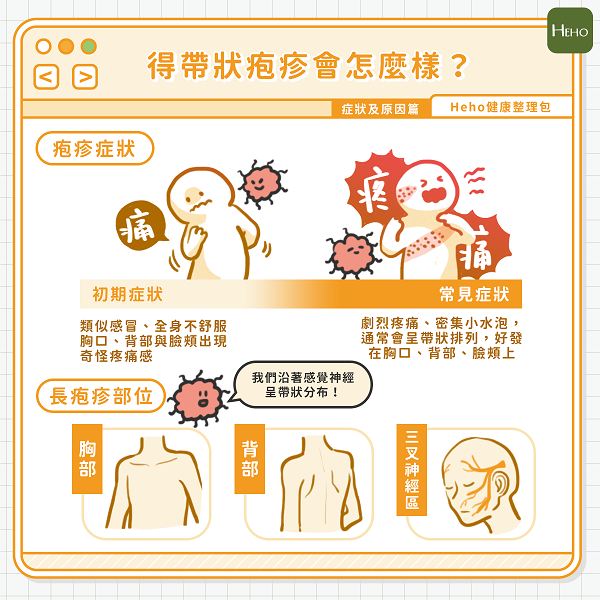Many people feel fearful when they hear about shingles (commonly known as herpes zoster). This disease is caused by the varicella-zoster virus, which lies dormant in the dorsal root ganglia and reactivates when the body's immunity is compromised, leading to the onset of shingles. The condition is often accompanied by severe pain, causing significant discomfort to the patient. How does shingles occur? It’s actually the chickenpox virus. (Image/Provided by Heho Health)What is Shingles?
How does shingles occur? It’s actually the chickenpox virus. (Image/Provided by Heho Health)What is Shingles?
Shingles is a skin disease caused by the varicella-zoster virus, which often manifests when immunity is low. There is a one in three chance that this virus will reactivate during our lifetime, leading to shingles. The most common areas affected are the chest, back, and the trigeminal nerve region on the face.
Early symptoms resemble those of a cold, such as runny nose, mild cough, and muscle aches. This is followed by a sharp, stinging pain and the appearance of clusters of small blisters on the affected skin. These blisters typically appear in a band-like pattern and are accompanied by intense pain, which may persist for months or even longer after the rash disappears, particularly in older individuals. What happens with shingles? A complete explanation of common symptoms and affected areas. (Image/Provided by Heho Health)Complications and Sequelae of Shingles
What happens with shingles? A complete explanation of common symptoms and affected areas. (Image/Provided by Heho Health)Complications and Sequelae of Shingles
Complications of shingles mainly include persistent nerve pain (known as postherpetic neuralgia), which is most common in older patients with weakened immunity. Additionally, shingles can lead to bacterial infections, causing cellulitis and even scarring. If shingles occurs on the face, it can result in conjunctivitis, keratitis, and even blindness, and it may also affect hearing or cause facial nerve paralysis. These sequelae can significantly impact the patient's quality of life, making early detection and treatment of shingles crucial.







